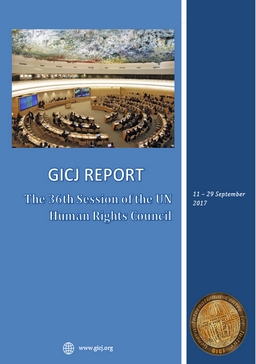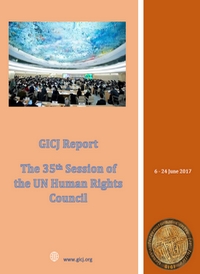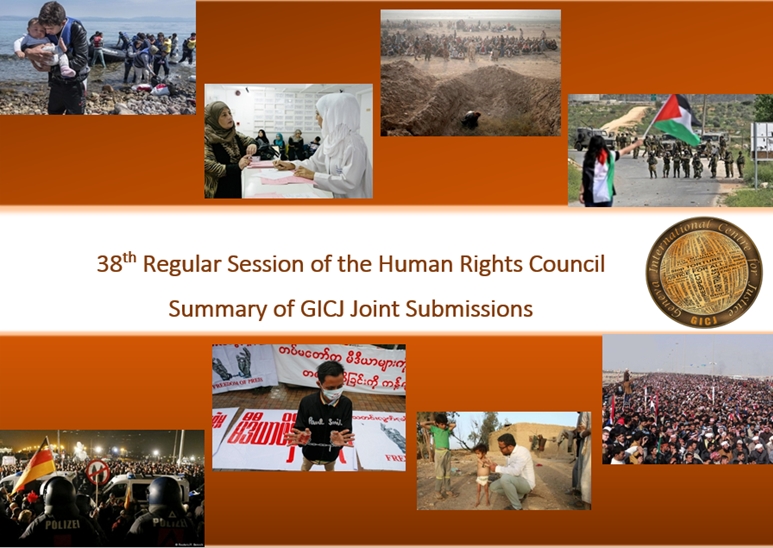
Geneva International Centre for Justice submitted eight jointly Written Statements with several signatories to the 38th Regular Session of the Human Rights Council. The statements covered a number of thematic in certain countries;
- Public Health of Refugees in Lebanon,
- Death Penalty and Summary Executions in Iraq,
- Freedom of Expression and Association in Iraq,
- Asylum-seekers in South-East Europe,
- Human rights situation in occupied Palestine,
- Freedom of the Press in Myanmar, and
- Racism and Xenophobia in Europe.
Each statement gave a description of the situation and the concerned human rights issues that the Human Rights Council should address; the statements also include recommendations for the Council and/or concerned countries.
Children in Yemen: the future of a whole generation is under threat
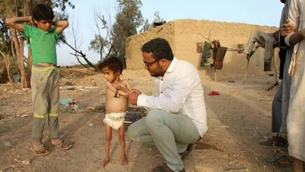 The Yemeni population has been living in an ongoing civil war for more than four years now and it is experiencing a grave humanitarian crisis. At the centre of this, children are one category of the population that is most vulnerable and affected by this ongoing conflict. In fact, they are facing several violations of their most basic human rights and are victims of different forms of violence. In addition, they are equally directly or indirectly affected by numerous violations of international humanitarian law which have been committed from all parties to the conflict. This statement wants to illustrate some of the ways in which this war is affecting some of their basic human rights, such as their right to education and health. The statement equally outlines two worrisome practices that are taking place in this context: child marriage and child recruitment.
The Yemeni population has been living in an ongoing civil war for more than four years now and it is experiencing a grave humanitarian crisis. At the centre of this, children are one category of the population that is most vulnerable and affected by this ongoing conflict. In fact, they are facing several violations of their most basic human rights and are victims of different forms of violence. In addition, they are equally directly or indirectly affected by numerous violations of international humanitarian law which have been committed from all parties to the conflict. This statement wants to illustrate some of the ways in which this war is affecting some of their basic human rights, such as their right to education and health. The statement equally outlines two worrisome practices that are taking place in this context: child marriage and child recruitment.
|
Recommendations: - All parties to the conflict should respect human rights and international humanitarian laws. In particular, they should stop targeting civilian infrastructures such as schools and hospitals, and halt all forms of violence and human rights violations against minors. - The international community and the Yemeni government should take all possible measures to ensure access to humanitarian workers in order to provide humanitarian aid to all Yemenis in urgent need. - The Yemeni government should ensure that children’s basic human rights, such as their right to health and education, are respected. Furthermore, serious efforts should be made by all relevant actors to halt child recruitment. - The Yemeni government should clearly define in its legislation the minimum age for marriage in compliance with the international treaties it has ratified. - The international community should enhance its efforts to reach a political solution to this conflict and, in the meantime, take all possible measures and actions to put in place a ceasefire agreement in order to alleviate prolonged civilian suffering and facilitate access of humanitarian aid. |
Link to full Written Statement
Cancer: The Public Health Challenge for Syrian Refugees in Lebanon
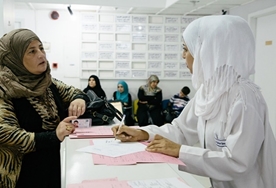 Since the outbreak of the civil war in Syria in March 2011, over 11 million Syrians fled their homes. The majority have sought refuge in neighbouring countries such as Turkey, Lebanon and Jordan. Over one million refugees have settled in Lebanon since the outbreak of the war, making it the country with the highest per capita concentration of refugees in the world. This large influx of refugees has exacerbated the political, economic and security challenges of the country. Furthermore, it has equally placed a considerable burden on the Lebanese health system. Due to irregular funding, many Syrian refugees have died of cancer. This statement aims to illustrate some of the mains challenges Syrian refugees are facing in terms of accessing to health care, such as no access to legal status and financial hardship.
Since the outbreak of the civil war in Syria in March 2011, over 11 million Syrians fled their homes. The majority have sought refuge in neighbouring countries such as Turkey, Lebanon and Jordan. Over one million refugees have settled in Lebanon since the outbreak of the war, making it the country with the highest per capita concentration of refugees in the world. This large influx of refugees has exacerbated the political, economic and security challenges of the country. Furthermore, it has equally placed a considerable burden on the Lebanese health system. Due to irregular funding, many Syrian refugees have died of cancer. This statement aims to illustrate some of the mains challenges Syrian refugees are facing in terms of accessing to health care, such as no access to legal status and financial hardship.
|
Recommendations for the government of Lebanon: - Sign the 1951 Refugee Convention in order to ensure the full legal protection for refugees and asylum seekers in Lebanon; - Develop a comprehensive refugee policy grounded in refugee rights and clear and appropriate administrative procedures for refugees from Syria in Lebanon. Include refugees who have entered through unofficial border crossings; - Abolish the annual fee of $200 USD for the renewal of stay; - Address refugees’ exclusion from health care services and their unmet health needs; - Do not require a legal stay document to access local health service providers and hospitals; - Establish a sequence of health services, “the cancer continuum of care”; - International community and humanitarian actors should strengthen their information and services outreach to refugees, lobby the Lebanese government and provide support for the new comprehensive refugee policy reform; - International and local organizations should coordinate their actions with the government to ensure the continuum of care; - Explore the option of public-private initiatives to address the care continuum, support infrastructure development, capacity-building initiatives, and introduce price initiatives. |
Link to full Written Statement
Death Penalty and Summary Executions in Iraq
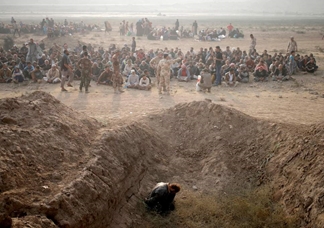 In Iraq, the number of executions continues to rise, even though article 15 of the Iraqi Constitution of 2005 encloses the right to life. With the adoption of the Anti-Terrorism law No.13 of 2005, Iraqi officials have a broad justification for implementing the death penalty and this resulted in the perpetration of numerous human rights violations, all under the pretext of combating terrorism. Furthermore, trials in Iraq are failing to respect international fair trial standards. The country has a weak judicial system, plagued by corruption, which frequently bases convictions on coerced confessions. This means that trial proceedings fail to meet international standards, allowing these executions to be based on discriminatory and sectarian motives – putting the lives of many innocent people under threat. The death penalty and extrajudicial executions in Iraq are used as tools of political repression, to eliminate political opponents, and to maintain a reign of terror over the Iraqi population at large.
In Iraq, the number of executions continues to rise, even though article 15 of the Iraqi Constitution of 2005 encloses the right to life. With the adoption of the Anti-Terrorism law No.13 of 2005, Iraqi officials have a broad justification for implementing the death penalty and this resulted in the perpetration of numerous human rights violations, all under the pretext of combating terrorism. Furthermore, trials in Iraq are failing to respect international fair trial standards. The country has a weak judicial system, plagued by corruption, which frequently bases convictions on coerced confessions. This means that trial proceedings fail to meet international standards, allowing these executions to be based on discriminatory and sectarian motives – putting the lives of many innocent people under threat. The death penalty and extrajudicial executions in Iraq are used as tools of political repression, to eliminate political opponents, and to maintain a reign of terror over the Iraqi population at large.
|
Recommendations for the Human Rights Council: - Call on the Iraqi government to take all measures to amend the flawed justice system by ending arbitrary arrests, detention, unfair trials and the extrajudicial imposition of the death sentence; - Conduct a thorough, independent, impartial, and timely investigation into the Anti-Terrorism Law N0. 13 of 2005, and whether it contravenes international legal standards; - Appoint a UN Special Rapporteur for the human rights situation in Iraq; - Pressure the Iraqi government to abolish the death penalty in line with the recommendations made during the 2014 UPR. |
Link to full Written Statement
Freedom of Expression and Association in Iraq
The freedom of expression and association are vital in any well-functioning political system and should therefore be protected at all costs. These rights are established in article 19 and 20 of the Universal Declaration of Human Rights and article 19 and 21 of the International Covenant on Civil and Political rights. 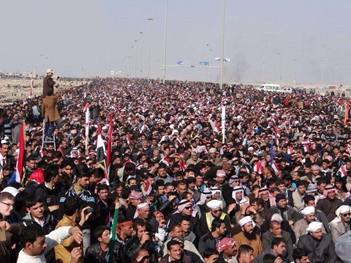 Both of these treaties are signed and ratified by the Iraqi government and thus the country has an international obligation to comply with these rights. In Iraq however, these freedoms are often not respected. There are numerous cases of violence used against peaceful protestors and kidnapping of activists, journalists and demonstrators. During and after the occupation of Iraq, Iraq became the most dangerous place for journalists. But even the defeat of ISIS does not keep journalists of fearing for their lives. Furthermore, it has become a trend that every protest in will end in violence. Moreover, the ruthless attacks against the peaceful civilian demonstrators by government forces are in serious violation of a number of fundamental human rights. The Iraqi government has proved unable, or unwilling, to ensure protection and to respect the fundamental rights of its citizens. The climate of impunity surrounding these illegal practices, including attacks against civilian properties and abduction of journalists and human rights defenders, perpetrated by governmental forces must end.
Both of these treaties are signed and ratified by the Iraqi government and thus the country has an international obligation to comply with these rights. In Iraq however, these freedoms are often not respected. There are numerous cases of violence used against peaceful protestors and kidnapping of activists, journalists and demonstrators. During and after the occupation of Iraq, Iraq became the most dangerous place for journalists. But even the defeat of ISIS does not keep journalists of fearing for their lives. Furthermore, it has become a trend that every protest in will end in violence. Moreover, the ruthless attacks against the peaceful civilian demonstrators by government forces are in serious violation of a number of fundamental human rights. The Iraqi government has proved unable, or unwilling, to ensure protection and to respect the fundamental rights of its citizens. The climate of impunity surrounding these illegal practices, including attacks against civilian properties and abduction of journalists and human rights defenders, perpetrated by governmental forces must end.
|
Recommendations: - Relevant UN bodies open an independent investigation into the allegations that the Iraqi government and its forces have abused the right to freedom of expression and opinion, and the right to freedom of assembly; - The international community to undertake all measures to ensure that Iraq protects and guarantees the right of individuals to demonstrate peacefully, and stops the targeting of human rights defenders, journalists, and peaceful activists; - An independent commission of inquiry to investigate all human rights abuses in Iraq, including the violation of the right to freedom of expression and the right to peaceful assembly; - Ensure journalists are protected against harassment and violence while performing their duty, and that all allegations of such harassment or violence are promptly and thoroughly investigated, and those responsible are held accountable; - The UN Human Rights Council should appoint a Special Rapporteur for the human rights situation in Iraq; - There should be a country visit to Iraq from the Special Rapporteur on the promotion and protection of the right to freedom of opinion and expression. |
Link to full Written Statement
South-Eastern Mediterranean: The incorporation of the EU Asylum Directives in the South-Eastern EU Countries
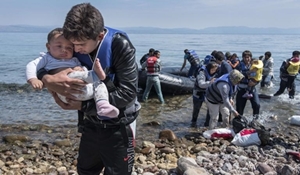 GICJ jointly with other organizations submitted a written statement on the incorporation of the EU Asylum Directives in Greece, Italy, Malta and Cyprus, namely the countries which constitute the main points of entry of asylum seekers in Europe. The two EU Directives aim at establishing common procedures for the reception of applicants for international protection and for granting and withdrawing international protection.
GICJ jointly with other organizations submitted a written statement on the incorporation of the EU Asylum Directives in Greece, Italy, Malta and Cyprus, namely the countries which constitute the main points of entry of asylum seekers in Europe. The two EU Directives aim at establishing common procedures for the reception of applicants for international protection and for granting and withdrawing international protection.
The full and correct incorporation of the Directives in the national legal orders of the South-Eastern EU Member States constitutes an imperative need and the undersigning organizations urge that more action is taken immediately towards this direction. To this end, the signing organizations made recommendations to the Special Rapporteur on the rights of migrants as well as the States concerned.
|
Recommendations: - Greece urgently takes legislative action in order to fully incorporate Directive 33 into its national legislation. It is also an imperative need that Greece reviews its current legislation regarding the detention of applicants seeking international protection; - Malta amends its legislation to broaden the definition of family members, clarify the notions of “sufficient resources” and “reasonable period of time” and sets a minimum threshold for the provision of health care; - Cyprus regulates the judicial review of applicants who have lodged an application prior to 20 July 2015. It should also provide guarantees for persons who have attempted to file an application, but have failed to do so. Cyprus should also amend its legislation for material reception conditions to be provided to asylum seekers during the first days subsequently to their arrival and provide guarantees for vulnerable persons to not be detained; - Italy amends its whole judicial review system and elaborates on the notion of “adequate standard of living and subsistence” and envisages specific financial support for different categories, such as people with special needs; - The Special Rapporteur on the human rights of migrants makes specific reference to the situation in South-Eastern Europe and makes recommendations for the amelioration of the human rights conditions of asylum seekers in the area. |
Link to full Written Statement
Myanmar: Freedom of the Press should be Urgently Restored
GICJ jointly with other civil society organizations brought the topic of freedom of the press in Myanmar to the attention of the Human Rights Council. The Myanmar government maintains tight control over the media sector through the use of harsh defamation and other laws. Authorities are increasingly abusing various draconian colonial and military era laws to repress reporting on a widening range of topics. The media landscape is marked by the delay of legislative reforms, and the increasing use of litigious tactics to hamper media freedom, while journalists are constantly being arrested and prosecuted.
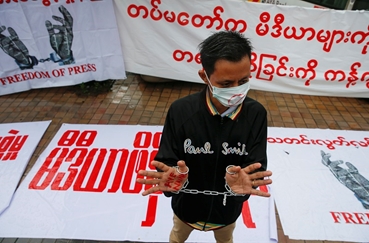
[Photo source: ipi.media]
The government's repressive focus now is on censoring coverage of western Rakhine State, from where over 680,000 Rohingya Muslim refugees have fled military violence into neighbouring Bangladesh since August 25 last year. Most –if not all- journalists feel discouraged to remain in the country and continue reporting on the ethnic cleansing taking place against the Rohingya.
GICJ submitted that the prosecution and threats against journalists hampers the unveiling of the truth regarding the Rohingya crisis and the transition of Myanmar to democracy. There is an imperative need that freedom of the press is restored immediately and journalists be provided the opportunity to investigate the crimes taking place.
|
Recommendations: - The Myanmar government immediately drops charges against all detained journalists, including the two Reuters journalists; - The Human Rights Council adopts a resolution condemning the grave violations of freedom of the press in Myanmar; - The Human Rights Council considers sanctions to be taken against Myanmar, after assessing the situation holistically; - The international community presses for the release of all the journalists held in captivity in Myanmar, including the two Reuters journalists; - The Myanmar government provides local and foreign journalists with media visas and grants them access to cover the incidents taking place in the Rakhine State at their own responsibility and discontinue using security reasons as a ground for not granting access to the region; - Myanmar reviews its legal framework regarding freedom of speech and freedom of expression and adopts legal instruments, which do not reflect a military perspective; - Myanmar ceases enforcing laws, which date back to the colonial or military rule era; - Myanmar ceases deterring journalists and representatives of international organs from reporting the living conditions of the Rohingya and the crimes committed against them. |
Link to full Written Statement
Occupied Palestinian Territory Occupation – No End in Sight
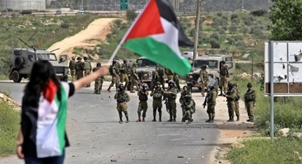 In recent years, the human rights situation in Palestine and other Occupied Territories have continued to deteriorate. Additionally, measures taken and activities administered against the people of Palestine indicate that a peaceful resolution to end the conflict is slipping away.
In recent years, the human rights situation in Palestine and other Occupied Territories have continued to deteriorate. Additionally, measures taken and activities administered against the people of Palestine indicate that a peaceful resolution to end the conflict is slipping away.
The serious situation of human rights in the Occupied Palestinian Territories has been long-standing and the recent attacks against Palestinian protesters is not a one-time account. While it should not be taken lightly and is a serious offense by the perpetrators, it should serve to shed light on the occupation of the Palestinian territories by the state of Israel as a whole. The treatment and denial of rights such as the right to life, right to health, right to peaceful assembly and association, and the right to a nationality and family life among numerous others deserves the full attention of the Human Rights Council and the international community at large.
|
Recommendations for the Human Rights Council: - Urge the Security Council to institute Chapter 7 of the UN Charter regarding the Israel-Palestine situation; - Urge the Council to investigate whether Israel is committing genocide against Palestinian people; - Compel Israel to reform its child registration laws in relation to ensuring the rights and nationality of Palestinian children; - Ensure the voluntary right of return of Palestinian refugees and internally displaced persons as well as property restitution, compensation and redress for losses and damages to their lands and homes; - Oblige Israel and other relevant member states to cease all measures taken towards altering the character and status of the Holy City of Jerusalem; - Put pressure on Israel to comply with UN resolutions and cooperate with UN Special Procedures concerning the human rights situation in the Occupied Palestinian Territories. |
Link to full Written Statement
Growing Racism and Xenophobia in Europe
In the past decade Europe has undergone economic and political crises and has experienced significant increases in migrants, especially refugees and asylum seekers. This is an important phenomenon to realise as blame for these crises and ensuing situations unjustly fall on minority groups. In addition, violent 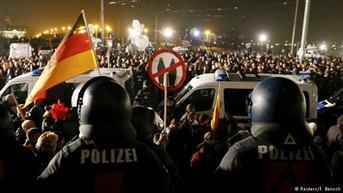 extremists who are on the rise have committed acts of violence and have sought to unrest societies and communities in Europe. However, the concerning responses to this phenomenon and towards hostile acts have been regrettably directed in the wrong directions by both civilians and politicians alike that has resulted in unfortunate circumstances and negative stereotypes.
extremists who are on the rise have committed acts of violence and have sought to unrest societies and communities in Europe. However, the concerning responses to this phenomenon and towards hostile acts have been regrettably directed in the wrong directions by both civilians and politicians alike that has resulted in unfortunate circumstances and negative stereotypes.
In addition to race-based violent attacks, hate speech and verbal slurs discrimination is still a serious issue in economic, social and political fields such as housing, employment, health services, education, political participation and criminal justice among others. Moreover, the media is continuously being exploited to spread xenophobia, stereotypes, and untrue claims. Politicians, journalists, and opinion-makers have a crucial part to play in not only exposing racial hatred and discrimination but also in promoting diversity and respect for human rights against racism as emphasised under several existing conventions and resolutions.
|
Recommendations for states: - Put in place measures to increase and enhance data collection; - Adopt and fully implement the DDPA; - Commit Protocol No. 12 of ECHR; - Use media to combat racism and promote human rights education; - Increase awareness and access to justice with guaranteed safety to appropriate judiciary systems. |
Link to full Written Statement
GICJ's Participation at the 38th Regular Session of the Human Rights Council
|
Read online or download the full report. |
|
GICJ's Participation at the Human Rights Council:
|
|
|
|




